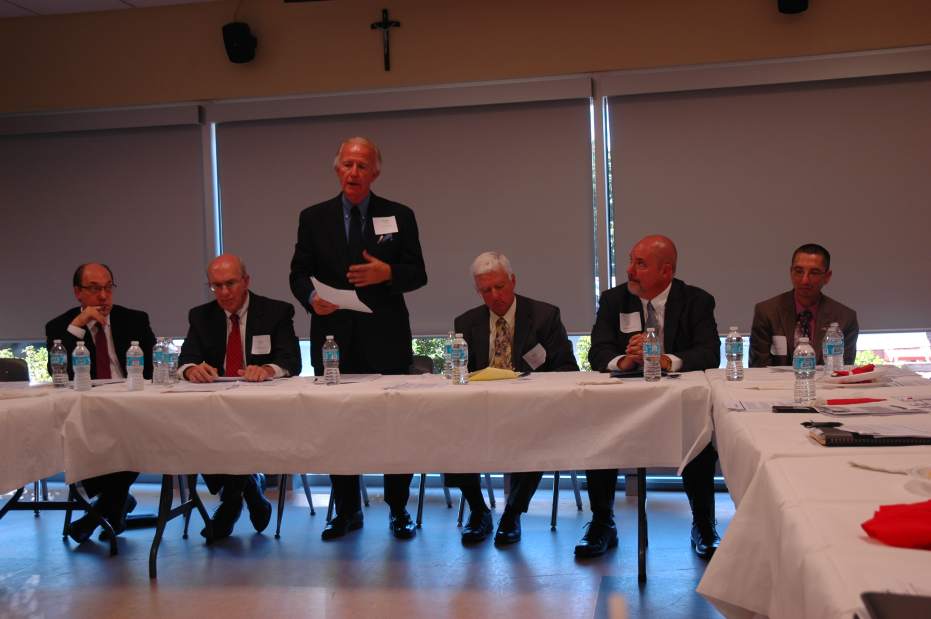
Robert D. Haramia of Harwil Associates in Clairton was moderator for the Mon Yough Area Chamber of Commerce 'lunch and learn' session on the Affordable Care Act on Thursday at Auberle. Panelists included, seated from left, John Mills of UPMC Health Plan, Joseph A. Vater Jr., Esq., of Meyer, Unkovic & Scott, James C. Cooper of Jefferson Regional Medical Center, A.J. Harper of the Hospital Council of Western Pennsylvania and Carl Knoblock of the Small Business Administration.
‘Lunch and learn’ event looks at health care act
By Patrick Cloonan
Published: Friday, July 26, 2013, 2:26 a.m.
Updated: Friday, July 26, 013
Change is coming to health care in the United States regardless of what happens to the Affordable Care Act, a panel of experts told the Mon Yough Area Chamber of Commerce.
A “lunch and learn” seminar at McKeesport's Auberle on Thursday addressed legal, medical and business angles of health care reform, although no one referred to it as “ObamaCare.”
“Do whatever has to be done to make sure you are in compliance,” moderator Robert Haramia of Harwil Associates in Clairton said.
Carl Knoblock, director of the Small Business Administration's Western Pennsylvania district, urged businesses
to develop a 3-5 year strategic plan that includes health care.
“You are dealing with a series of regulators,” Knoblock said, including the IRS and departments of Labor and Health and Human Services.
“Are they necessarily talking to each other? No,” he said.
By Patrick Cloonan
Published: Friday, July 26, 2013, 2:26 a.m.
Updated: Friday, July 26, 013
Change is coming to health care in the United States regardless of what happens to the Affordable Care Act, a panel of experts told the Mon Yough Area Chamber of Commerce.
A “lunch and learn” seminar at McKeesport's Auberle on Thursday addressed legal, medical and business angles of health care reform, although no one referred to it as “ObamaCare.”
“Do whatever has to be done to make sure you are in compliance,” moderator Robert Haramia of Harwil Associates in Clairton said.
Carl Knoblock, director of the Small Business Administration's Western Pennsylvania district, urged businesses
to develop a 3-5 year strategic plan that includes health care.
“You are dealing with a series of regulators,” Knoblock said, including the IRS and departments of Labor and Health and Human Services.
“Are they necessarily talking to each other? No,” he said.
Knoblock said assisting employees with mandatory paperwork will help in the long run, regardless of whether a company offers insurance.
Companies will have to offer insurance if they employ the equivalent of at least 50 full-time employees working at least 30 hours a week, or they could be fined $2,000 per employee under the Affordable Care Act.
Attorney Joseph A. Vater Jr. of Meyer Unkovic & Scott said he doubts that the limit will be changed from 50.
Vater handed out explanations of how full-time equivalence is determined for part-timers.
The usual way will be to take the aggravate number of work hours in a month and divide that sum by 120.
Hospital Council of Western Pennsylvania president A.J. Harper said that even politicians opposed to the 2010 law tell him they find “a lot in this legislation that they like.”
Harper pointed out cuts in federal payments for Medicaid and Medicare, including a 2 percent across-the-board cut because of budget sequestration.
Harper said refusal to expand Medicaid cost Pennsylvania 35,000 jobs and greater Disproportional Share Hospital adjustment payments to cover large volumes of low-income patients.
Some panelists stressed an emphasis on wellness, be it to encourage employees to stop smoking, or managing stress or community activities such as walks.
“Over half of (medical) expenses are directly linked to personal health care choices,” Jefferson Regional Medical Center senior vice president James C. Cooper said.
John Mills, senior director of commercial projects for UPMC Health Plan, said there will be changes in how much is charged for insurance.
Mills said companies now can charge a 64-year-old up to five times what a 19-year-old is charged, but the Affordable Care Act allows only up to three times that much.
Mills said tobacco use could mean 50 percent greater premiums, but he expects hikes of only around 10 percent.
“We want (smokers) to go into tobacco cessation programs,” Mills said. “We want them to be honest.”
Cooper and Harper talked about research being done into community needs. Cooper said that led Jefferson to form a new obstetrics unit and add emphasis to women's services in Clairton.
Patrick Cloonan is a staff writer for Trib Total Media.
He can be reached at 412-664-9161, ext. 1967, or [email protected].
Companies will have to offer insurance if they employ the equivalent of at least 50 full-time employees working at least 30 hours a week, or they could be fined $2,000 per employee under the Affordable Care Act.
Attorney Joseph A. Vater Jr. of Meyer Unkovic & Scott said he doubts that the limit will be changed from 50.
Vater handed out explanations of how full-time equivalence is determined for part-timers.
The usual way will be to take the aggravate number of work hours in a month and divide that sum by 120.
Hospital Council of Western Pennsylvania president A.J. Harper said that even politicians opposed to the 2010 law tell him they find “a lot in this legislation that they like.”
Harper pointed out cuts in federal payments for Medicaid and Medicare, including a 2 percent across-the-board cut because of budget sequestration.
Harper said refusal to expand Medicaid cost Pennsylvania 35,000 jobs and greater Disproportional Share Hospital adjustment payments to cover large volumes of low-income patients.
Some panelists stressed an emphasis on wellness, be it to encourage employees to stop smoking, or managing stress or community activities such as walks.
“Over half of (medical) expenses are directly linked to personal health care choices,” Jefferson Regional Medical Center senior vice president James C. Cooper said.
John Mills, senior director of commercial projects for UPMC Health Plan, said there will be changes in how much is charged for insurance.
Mills said companies now can charge a 64-year-old up to five times what a 19-year-old is charged, but the Affordable Care Act allows only up to three times that much.
Mills said tobacco use could mean 50 percent greater premiums, but he expects hikes of only around 10 percent.
“We want (smokers) to go into tobacco cessation programs,” Mills said. “We want them to be honest.”
Cooper and Harper talked about research being done into community needs. Cooper said that led Jefferson to form a new obstetrics unit and add emphasis to women's services in Clairton.
Patrick Cloonan is a staff writer for Trib Total Media.
He can be reached at 412-664-9161, ext. 1967, or [email protected].

 RSS Feed
RSS Feed
